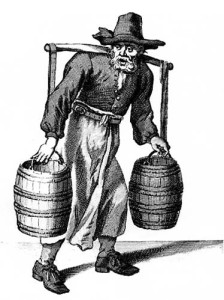Something broke in our infrastructure here a couple of days ago and the area where I live is now under a boil water alert. We have to boil any water we intend to use for cooking, handwashing dishes, drinking, or cleaning teeth (I’ve forgotten already a couple of times) for one minute, or use bottled water. It’s an annoyance but not impossible. No ice, though, unless I hunt down some ice trays, which I think I got rid of some time ago.
I can’t even compare it with Georgian London, which was a horrendously dirty city.
If I would drink water, I must quaff the mawkish contents of an open aqueduct, exposed to all manner of defilement, or swallow that which comes from the River Thames, impregnated with all the filth of London and Westminster.
Tobias Smollet, 1771.
 After the hasty and inadequate rebuilding of London in the previous century following the Great Fire, the city grew and grew. The water available became undrinkable. The wealthy could afford to buy spring water from street sellers. For everyone else, gin was a cheap substitute that would quench both thirst and misery. It’s said that the widespread availability of tea in the mid nineteenth century saved lives, since water had to be boiled.
After the hasty and inadequate rebuilding of London in the previous century following the Great Fire, the city grew and grew. The water available became undrinkable. The wealthy could afford to buy spring water from street sellers. For everyone else, gin was a cheap substitute that would quench both thirst and misery. It’s said that the widespread availability of tea in the mid nineteenth century saved lives, since water had to be boiled.
 Even by the end of the nineteenth century London water was suspect. Here’s a water seller from 1900 in Cheapside.
Even by the end of the nineteenth century London water was suspect. Here’s a water seller from 1900 in Cheapside.
It’s ironic when you consider that London was once a city of many rivers, some lost, and some like the River Fleet, now completely underground.  It went from being a healthy spring, making the suburb of Hampstead something of a spa resort, to an open sewer, to a river that is now almost completely invisible. But this print of the Fleet in the area of St. Pancras in 1825 shows how comparatively rural London was at this time, before the huge expansion of the Victorian age. If you want to know more, there’s a book which promises hours of fun, London’s Lost Rivers by Paul Talling. If you visit his website, londonslostrivers.com, there’s a fascinating slideshow of photographs. More about the Fleet here.
It went from being a healthy spring, making the suburb of Hampstead something of a spa resort, to an open sewer, to a river that is now almost completely invisible. But this print of the Fleet in the area of St. Pancras in 1825 shows how comparatively rural London was at this time, before the huge expansion of the Victorian age. If you want to know more, there’s a book which promises hours of fun, London’s Lost Rivers by Paul Talling. If you visit his website, londonslostrivers.com, there’s a fascinating slideshow of photographs. More about the Fleet here.
Some other links:
London’s lost rivers: the hidden history of the city’s buried waterways
In search of London’s lost rivers
and the London rivers action plan to restore the rivers.
There are walking tours of the lost rivers (and of the London sewers should you be so inclined. I wonder if Risky Diane has that on her itinerary?) Yet another thing to do in London. Is there something out of the ordinary you’d like to do or visit in London?
